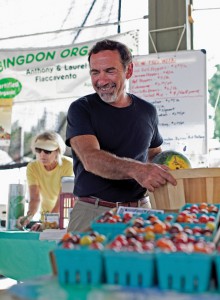Running On Reality: A Conversation with Anthony Flaccavento
This is an abridged version of this interview that published in the print edition of our June/July 2013 issue. You can read the full transcript here.

Organic farmer and one-time congressional candidate Anthony Flaccavento works to build a “bottom-up” economy in Appalachia. Photo by Laura Elizabeth
Pohl, courtesy of Bread for the World
For more than 20 years, Anthony Flaccavento has worked to build bridges between small-scale organic growers like himself and farmers markets, grocery stores and public schools. He founded Appalachian Sustainable Development in 1995, a nonprofit that became a regional leader in economic development.
Last year, Flaccavento won the Democratic primary in southwestern Virginia’s 9th congressional district, campaigning on his experience in community development. He lost the general election to Republican incumbent Morgan Griffith, and now runs Abingdon Organics, a farm, and SCALE, Inc., a consulting group that supports local economies. This interview is excerpted from a conversation at the Appalachian Voices office in Boone, N.C.
What were your goals when you decided to run for Congress?
When I entered, I really had two rules, neither of which was winning. One was to improve the substance of the debate by starting to talk about meaningful things, including the bottom-up economy. I thought I could change the debate a little bit, I thought I could introduce some more thoughtfulness and more honesty.
My second goal was to galvanize progressive-thinking people, mostly the Democratic persuasion but of all stripes: independents and even some moderate Republicans. So I thought there was a way for me to do that … by being honest about the issues and putting forward this vision that made sense to people.
About halfway through the campaign, after winning the Democratic nomination, I started thinking, “Maybe I should try to win.”
During the campaign you described yourself as “pro-coal miner” rather than “pro-coal.” Did that approach help or hinder your message?
I think it did [help]. I won the [United Mine Workers of America] over with great enthusiasm after a lot of initial skepticism … I would say, “I’m a farmer, I don’t like government regulation any more than you, but the fact is that you and I are obligated to be responsible to our neighbors downwind and downstream. That doesn’t mean that I’m going to support everything the EPA does, but it’s only right that we protect people. I’ve got to do it as a farmer and you’ve got to do it as a miner.”
The big lie is that it’s been regulations in this administration that have killed coal … I stuck with saying, “I’ll fight for you every step of the way but we’ve got to create other jobs,” which was my message to the mining community.
Appalachian politicians have a substantial influence on our nation’s energy and environmental policy. Do you think they can embrace alternatives and help build the bottom-up economy?
The power and influence of a small group of Appalachian legislators who are in states that control a tiny part of our energy portfolio is similar to farm state senators who are on the agriculture committees. In both cases, it’s a group of elected officials who’ve somehow concluded that the only thing you can do is fight for what you’ve got, because there’s no alternative.
What I’ve been saying for my whole career in Appalachia and certainly during my campaign is, “There are alternatives.” There are alternatives in energy policy and there are alternatives in agricultural policy.
What’s been lacking among the leaders in our region, in the House and the Senate as well as at the state level, is a willingness to speak honestly about the coal industry and along with that a lack of any sense of alternatives.
Where do you see things heading, and how do we get there?
The core idea is that of creating a bottom-up economy … We know trickle-down economics has not worked. We know that it has concentrated wealth at unparalleled levels. We know that it has denuded communities by taking capital out so that independent businesses are disfavored compared to franchises, Wal-Marts and mega-chains … What we don’t know is, if we have the right public policy, could it be transformative in places like Appalachia? I think it could …
We know coal is in decline just like we knew tobacco was in decline. The response of cooperative extensions and universities at that time was “nothing can replace tobacco.” It was incredible that the intellectual and the technical entities that were supposed to be helping farmers just couldn’t see past tobacco’s decline in the same way that people are stuck on coal.
What has happened in food and farming over the last decade and a half is a shift … from a lot of despair and doubt about there being any alternatives to replace those things, we’ve shown that integrated, diverse approaches can work. I think we take that same approach to the economy as a whole.
Related Articles
Latest News

Leave a comment
Your email address will not be published. Required fields are marked *





Leave a Comment